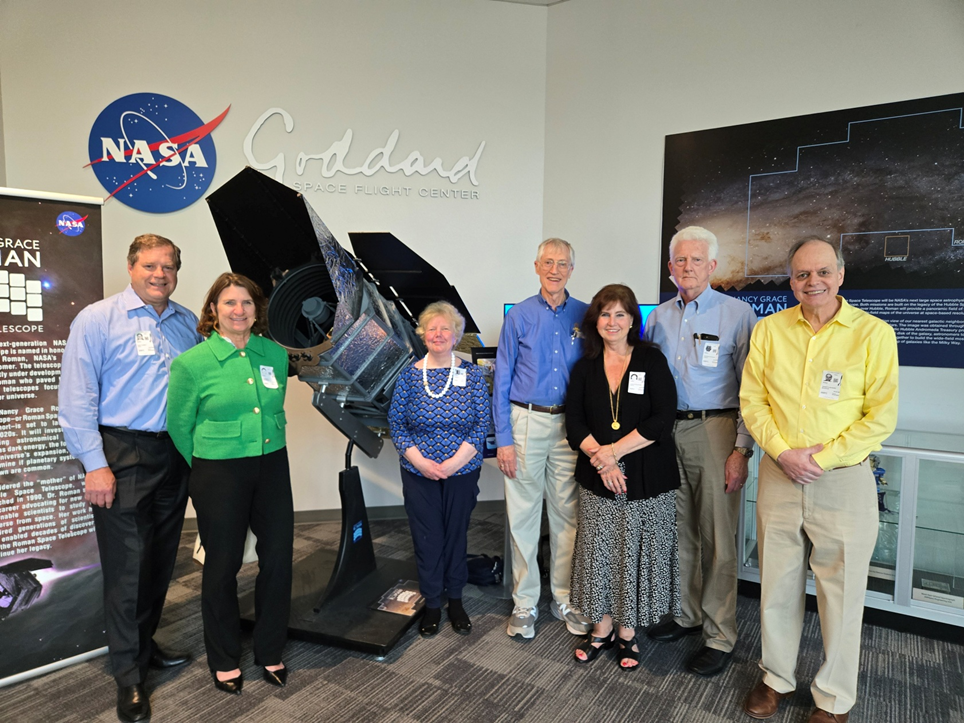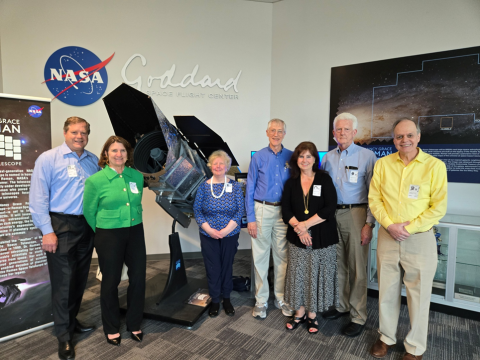On May 30, an ARCS MWC team got a chance to reach for the stars as a result of a winning bid at the 2025 MWC Eagle Award Celebration! Julie and Kurt Hohl, Charlotte and Steve Knight, and Elli Nesbitt and Ken Bourque were given an in-depth tour of the National Aeronautics and Space Administration’s (NASA) Goddard Space Flight Center (GSFC) by Dr. John Mather, Senior Astrophysicist and Nobel Laureate in Physics!
Since its founding in 1959, GSFC has successfully supported a multitude of spacecraft, telescopes, and satellites through a mix of design, assembly, control, communications, testing and many other functions. Dr. Mather showed the MWC team around the GSFC’s custom-built infrastructure, including the world’s largest clean room and multiple testing bays that subject the spacecraft and instruments to the most severe conditions they are likely to face. He provided an amazing amount of information and readily answered questions, giving the group a greater understanding of the U.S. space program. He also generously gifted and signed copies of his book!
The MWC team watched in awe as the clean room staff worked on the Nancy Grace Roman Space Telescope (RST), preparing it for launch in 2027. The RST is named after NASA’s first chief astronomer, who is also known as “the Mother of the Hubble Space Telescope.” NASA says the RST’s visible and infrared camera will have a field of view at least 100 times wider than Hubble’s, enhancing exploration of dark energy, exoplanets and infrared astrophysics.
As with other NASA missions, the RST’s novel technologies will likely provide significant U.S. economic and medical benefits. For example, some of the Hubble’s and James Webb Space Telescope’s technologies have reportedly improved diagnosis and treatment of ocular diseases; provided clearer images from mammography biopsies and identified smaller calcifications; and increased the accuracy of diagnoses from arthroscopic surgery, to name a few applications. The spinoffs also apply to other sectors, including semiconductors.
Dr. Mather has contributed substantially to science and the U.S. space program and has expanded society’s knowledge of space. The GSFC’s longstanding, custom-bult infrastructure and impressive testing regimens have also proven to be invaluable in ensuring the successes of the American space program. However, its track record stems from the dedication and knowledge of its scientists, engineers, and technicians, including ARCS Scholar Alumni.
ARCS Stands Strong with Science!

Pictured l-r: Kurt and Julie Hohl, Elli Nesbitt, Dr. John Mather,
Charlotte and Steve Knight, and Ken Bourque.
View all photos of the tour here!

